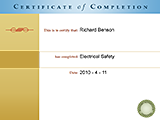Oil Spill Clean Up Response 2: Countermeasures on Land
- Product ID
- efgroscl_vod
- Training Time ?
- 27 to 41 minutes
- Language(s)
- English
- Video Format
- Standard Definition Wide
- Required Plugins
- None
- Number of Lessons
- 11
- Quiz Questions
- 15
- Question Feedback
- Wrong Answer Remediation
- Lesson Bookmarking
- Downloadable Resources



Online video for cleaning up oil spills on land
Countermeasures on Land is the second in a five part training series on Oil Spill Response training. This oil spill video program, created with the assistance of the US Coast Guard, provides important health and safety information for clean-up workers; and provides information consistent with OSHA and USCG regulations. This oil spill response training focuses on countermeasures taken on land, and includes the ecological impact of oil spills on land and along the shoreline; possible contingency plans; control activities and spill countermeasures: low and high pressure washing, sand blasting, soil washing, physical removal, mechanical removal, vacuum pumping, use of sorbents, degradation and bioremediation. Other topics include the potential impact of treatment methods; safety precautions; how land oil spills behave; how to prepare for an approaching oil spill; how intrusive clean-up methods can delay natural recovery; and the special problems of shoreline clean-up.
Video-On-Demand (VOD): Classroom full-screen presentation or individual play.
![]() This course is in the Video On Demand format, to read about Video On Demand features click here.
This course is in the Video On Demand format, to read about Video On Demand features click here.

- Full-screen video presentation
- Print certificate and wallet card
- You have 30 days to complete the course
Emergency oil spill responders who are called upon to control and clean up oil spills.
- Introduction and Priorities
- Areas Impacted
- Oil Properties
- Clean-up Plan
- Potential Risk Areas and Activities
- Clean-Up Methods
- Sorbents & Surface Washing Agents
- Bioremediation
- Shoreline Issues
- OSHA, Hazards, and Personal Protection
- Summary
- Understand the ecological impact of oil spills on land and along the shoreline.
- Recognize contingency plans.
- Control activities and spill countermeasures.
- Be aware of the potential impact of treatment methods.
- Follow safety precautions.
- Recognize how land spills behave.
- Help prepare for an approaching spill.
© Mastery Technologies, Inc.




